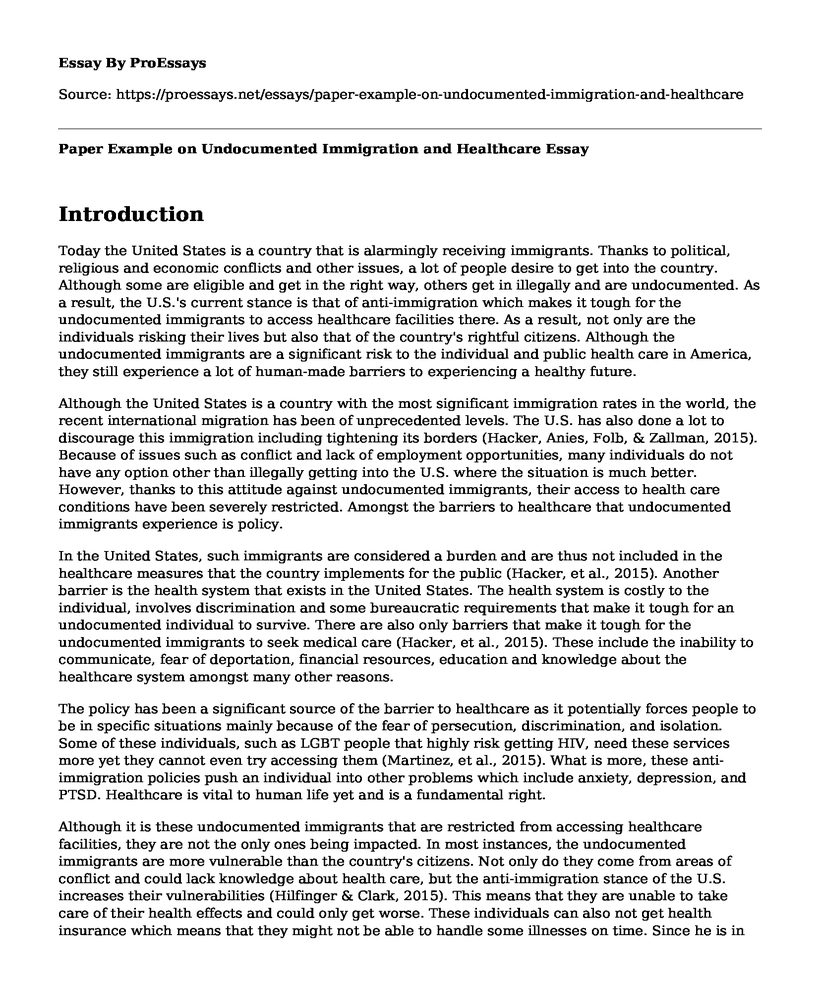Introduction
Today the United States is a country that is alarmingly receiving immigrants. Thanks to political, religious and economic conflicts and other issues, a lot of people desire to get into the country. Although some are eligible and get in the right way, others get in illegally and are undocumented. As a result, the U.S.'s current stance is that of anti-immigration which makes it tough for the undocumented immigrants to access healthcare facilities there. As a result, not only are the individuals risking their lives but also that of the country's rightful citizens. Although the undocumented immigrants are a significant risk to the individual and public health care in America, they still experience a lot of human-made barriers to experiencing a healthy future.
Although the United States is a country with the most significant immigration rates in the world, the recent international migration has been of unprecedented levels. The U.S. has also done a lot to discourage this immigration including tightening its borders (Hacker, Anies, Folb, & Zallman, 2015). Because of issues such as conflict and lack of employment opportunities, many individuals do not have any option other than illegally getting into the U.S. where the situation is much better. However, thanks to this attitude against undocumented immigrants, their access to health care conditions have been severely restricted. Amongst the barriers to healthcare that undocumented immigrants experience is policy.
In the United States, such immigrants are considered a burden and are thus not included in the healthcare measures that the country implements for the public (Hacker, et al., 2015). Another barrier is the health system that exists in the United States. The health system is costly to the individual, involves discrimination and some bureaucratic requirements that make it tough for an undocumented individual to survive. There are also only barriers that make it tough for the undocumented immigrants to seek medical care (Hacker, et al., 2015). These include the inability to communicate, fear of deportation, financial resources, education and knowledge about the healthcare system amongst many other reasons.
The policy has been a significant source of the barrier to healthcare as it potentially forces people to be in specific situations mainly because of the fear of persecution, discrimination, and isolation. Some of these individuals, such as LGBT people that highly risk getting HIV, need these services more yet they cannot even try accessing them (Martinez, et al., 2015). What is more, these anti-immigration policies push an individual into other problems which include anxiety, depression, and PTSD. Healthcare is vital to human life yet and is a fundamental right.
Although it is these undocumented immigrants that are restricted from accessing healthcare facilities, they are not the only ones being impacted. In most instances, the undocumented immigrants are more vulnerable than the country's citizens. Not only do they come from areas of conflict and could lack knowledge about health care, but the anti-immigration stance of the U.S. increases their vulnerabilities (Hilfinger & Clark, 2015). This means that they are unable to take care of their health effects and could only get worse. These individuals can also not get health insurance which means that they might not be able to handle some illnesses on time. Since he is in contact with the citizens of the country, he will end up infecting them with the diseases and issues that he is experiencing.
In an era where the country is so against immigration, an undocumented individual will experience a lot of challenges that could be avoided. One of the areas where he is wholly forsaken is healthcare. Undocumented immigrants do not have access to healthcare facilities and are significantly encouraged by doing so. The U.S. government has gone on to design policies and create an environment that fails both the undocumented individual and citizen of the country by denying the last access to healthcare amenities.
References
Hacker, K., Anies, M., Folb, B., & Zallman, L. (2015). Barriers to health care for undocumented immigrants: a literature review. Risk Management and Healthcare Policy, 2015(8), 175-183. Doi: https://doi.org/10.2147/RMHP.S70173
Hilfinger, D. K., & Clark, M. M. (2015). The impact and implications of undocumented immigration on individual and collective health in the United States. Nursing Outloook, 63(1), 86-94. Doi: http://dx.doi.org/10.1016/j.outlook.2014.11.004
Martinez, O., Wu, E., Sandfort, T., Dodge, B., Carballo-Dieguez, A., Pinto, R., . . . Chavez-Baray, S. (2015). Evaluating the Impact of Immigration Policies on Health Status Among Undocumented Immigrants: A Systematic Review. Journal of Immigration and Minority Health, 17(3), 947-970. Doi: http://dx.doi.org/10.1007/s10903-014-9976-z
Cite this page
Paper Example on Undocumented Immigration and Healthcare. (2022, Jul 21). Retrieved from https://proessays.net/essays/paper-example-on-undocumented-immigration-and-healthcare
If you are the original author of this essay and no longer wish to have it published on the ProEssays website, please click below to request its removal:
- Essay Example. Burjeel Hospital: Service Area Structure Analysis Using Porter's Framework
- Research Paper on Thyroid Cancer
- Essay Sample on Canadian Male Streets Skinheads: Street Gangs or Street Terrorists
- Essay Example on Pharmacists: Criminal Law & Medicine Intersection Risk Analysis
- Essay Example on Interpersonal, Verbal & Written Communication: Strengthening Relationships
- Essay Sample on Reforming Healthcare: Managerial Accountability for Improved Patient Experiences
- Essay An Intervention Helpful for Group Process







